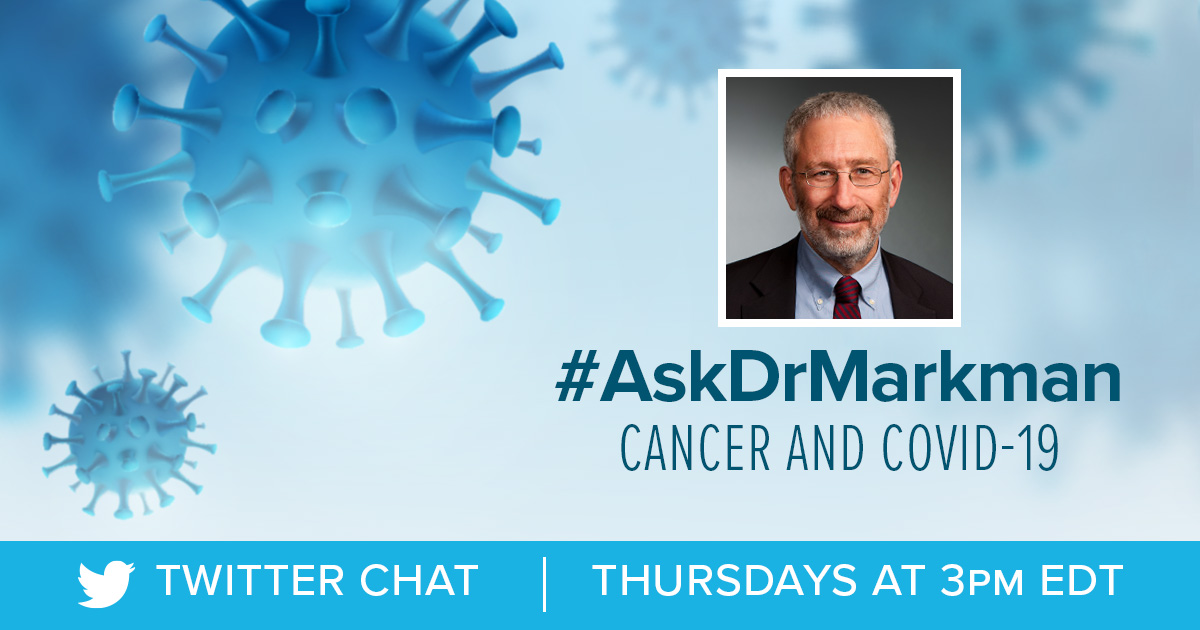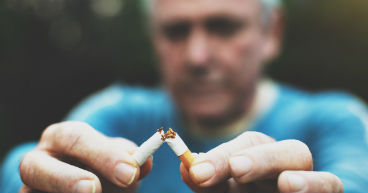
The COVID-19 pandemic has created a constantly evolving flow of new and sometimes confusing information. Cancer patients have many questions about how the virus may affect them, their access to ongoing treatments, their overall health and steps they can take to help reduce risk of infection. Maurie Markman, MD, President of Medicine & Science at Cancer Treatment Centers of America® (CTCA), has launched a weekly Q&A hosted on Twitter to answer your questions, in real time and as questions are sent to us online and by phone. Follow us on #AskDrMarkman. Here’s this week’s chat:
Question: I am a cancer survivor and am interested in updated information about whether a COVID-19 vaccine will be available soon.
Answer: There are a number of vaccine candidates being examined both in the laboratory and early clinical trials, but it not yet possible to provide a realistic timeline for when a safe and effective vaccine will be available for widespread use. A promising report on one product revealed a small number of healthy volunteers with no prior exposure to COVID-19 developed “neutralizing antibodies” against the virus after immunization. More extensive trials with this and other products are in progress.
Q: I have recently finished cancer treatment and am trying to be very careful, but some of my friends say they see no need to wear masks. Is there evidence that masks help prevent COVID-19 infection?
A: There are good reasons to believe that a properly fitted mask or face covering will reduce the risk that someone with COVID-19 will expose others nearby by sneezing or coughing. In one experiment, for example, where material used in surgical masks was placed between one cage with and one cage without infected hamsters, the risk of COVID-19 spread was found to be reduced by 75 percent.
Q: My mother is undergoing radiation, and I want to do everything I can to help her from getting COVID-19. President Trump recently said he’d been taking hydroxychloroquine. Is this something my mother should do?
A: While it had been actively studied in clinical trials, there is no reliable medical evidence that hydroxychloroquine or chloroquine is safe and effective when used either to prevent or treat COVID-19. It’s also critical to note that there’s very solid evidence that this class of drugs has the potential to cause serious cardiac abnormalities. In fact, the World Health Organization (WHO) recently announced it’s temporarily halting studies on hydroxychloroquine to treat COVID-19 over concerns it may do more harm than good.
Q: Now that I’ve finished my cancer treatment, I look forward to having more freedom, but I live in an area that’s still under stay-at-home orders. Have these policies have been helpful?
A: While it’s difficult to provide a definitive answer to this question, it must certainly be acknowledged that these policies have had some negative consequences for individuals, families and our society. But it’s also important to note a recent study found stay-at-home orders involving 30 of America’s largest cities may have prevented nearly 250,000 deaths and 2.1 million hospitalizations from COVID-19 infection.
Q: Are asymptomatic people still contagious more than a month after their documented COVID-19 infection, especially if they continue to test positive for the virus? I’m recovering from cancer surgery and don’t want to risk being exposed to anyone who may spread the virus.
A: While a definitive answer is not yet available, evidence suggests that formerly infected people who continue to test positive for the virus may simply have non-infectious viral particles in their system, and that they’re neither infectious nor likely to get sick a second time. It’s important to recognize that the body may take some time to remove these non-infectious particles, especially if the infection involved a relatively large viral load.
Q: I’m receiving radiation treatment for prostate cancer and am concerned about getting COVID-19. Can a dilute solution of hydrogen peroxide as a mouthwash be used to prevent this infection?
A: While this is an interesting idea, the major problem is that the virus does not remain confined to the mouth, but rather quickly moves to the nasal cavity and lungs, so this is very unlikely to be a useful strategy to prevent a COVID-19 infection. Plus, there’s the concern about side effects, especially inflammation of local tissue, associated with prolonged exposure to hydrogen peroxide. So, at the current time, this is not an appropriate prevention strategy.
Q: I keep hearing the term “herd immunity” in reference to society being feeling safe from COVID-19. What does this mean?
A: Herd immunity means that when a large enough percentage of the population has been exposed to COVID-19 and developed immunity from natural infection or through vaccination, it will be much more difficult for the virus to spread within that population. This has occurred with many viral infections, including the measles. However, such population-based immunity is unlikely to be relevant for COVID-19 until far more than half the entire population has achieved this immune (protected) state. Unfortunately, even in locations where COVID-19 has been highly prevalent, the overall percentage of the population that has been exposed is less than 10 percent, so we’re a long way off from herd immunity.
Q: After being laid off amid the COVID-19 shutdown, I’ve suffered interruptions in my insurance that have led to delays in my hormone therapy treatments. Should I be worried that my tumor will grow back without my treatments?
A: It is understandable that you are concerned with the disruption in receiving this treatment for your cancer. It would be most appropriate for you to discuss your concerns directly with your physician.
If you’re a cancer survivor or in active treatment and are concerned about how COVID-19 may impact you or your care, please contact your care team.
Learn more about managing your blood pressure during cancer treatment.



